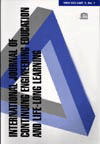
International Journal of Continuing Engineering Education and Life-Long Learning
Scope & Guideline
Elevating Engineering Disciplines through Lifelong Learning.
Introduction
Aims and Scopes
- Online Education Evaluation:
The journal emphasizes methods for evaluating online education, including mixed teaching approaches and the effectiveness of MOOCs (Massive Open Online Courses), using various statistical and machine learning techniques. - Resource Optimization and Sharing:
It explores the optimal allocation and sharing of educational resources, particularly in online settings, leveraging cloud computing, big data, and intelligent systems for improved access and efficiency. - Teaching Methodologies and Innovations:
The journal covers innovative teaching methodologies, including flipped classrooms, blended learning models, and personalized learning experiences, aimed at enhancing student engagement and learning outcomes. - Data-Driven Learning Behavior Analysis:
A core focus is on analyzing learning behaviors through data mining and machine learning, allowing for insights into student engagement and the effectiveness of teaching strategies. - Technology Integration in Education:
The journal discusses the integration of emerging technologies, such as AI, IoT, and virtual reality, into educational practices, promoting interactive and immersive learning experiences.
Trending and Emerging
- Artificial Intelligence and Machine Learning in Education:
There is a rising trend in the application of AI and machine learning techniques for personalizing learning experiences, evaluating teaching effectiveness, and analyzing student behavior. - Big Data Analytics for Learning Insights:
The use of big data analytics to derive insights from student learning behaviors and outcomes is gaining traction, with a focus on improving educational strategies and resource allocation. - Hybrid and Blended Learning Models:
A significant interest in hybrid learning models that combine online and face-to-face instruction is emerging, reflecting the need for flexible learning environments post-pandemic. - Fuzzy Logic and Advanced Statistical Methods:
The application of fuzzy logic and advanced statistical methods for evaluating educational quality and effectiveness is increasingly prevalent, providing nuanced insights into complex educational dynamics. - Personalized Learning Approaches:
There is a growing emphasis on personalized learning approaches that adapt to individual student needs, driven by advancements in technology and data analysis.
Declining or Waning
- Traditional Teaching Methods:
There has been a noticeable decline in research focused on traditional, non-digital teaching methods, as the emphasis shifts towards more innovative, technology-driven approaches. - Standardized Assessment Techniques:
Research on standardized assessment methods is decreasing, possibly due to a growing recognition of the limitations of such methods in capturing the complexities of learning in contemporary education. - General Educational Theory:
Themes that broadly address educational theory without specific application to engineering or technology contexts are becoming less frequent, as the focus narrows to practical applications and technological integration.
Similar Journals
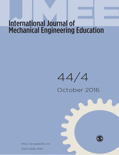
International Journal of Mechanical Engineering Education
Advancing Mechanical Minds through EducationThe International Journal of Mechanical Engineering Education, published by SAGE Publications Inc, serves as a premier platform dedicated to advancing the field of engineering education, with a specific focus on mechanical engineering. With a history dating back to 1981, this journal has established itself as a vital resource for researchers, educators, and industry professionals alike, offering insights and scholarly articles that foster innovation and improve pedagogical approaches within the discipline. The journal is currently indexed in Scopus, ranking #542 in Education and #311 in Mechanical Engineering, reflecting its significant contribution to both academic and engineering communities. Although it does not have open access options, the quality and depth of research disseminated through its pages are undeniable, making it an essential read for anyone involved in engineering education. With a Q3 categorization in both relevant fields as of 2023, the journal continually strives to enhance the learning experience and methodologies in mechanical engineering education, paving the way for a future generation of skilled engineers.

Smart Learning Environments
Exploring the future of educational innovation.Smart Learning Environments, published by Springer Heidelberg, is a leading open-access journal dedicated to advancing the field of educational technology and intelligent learning systems. Since its inception in 2014, this journal has established itself as a vital resource for researchers and practitioners, showcasing innovative interdisciplinary approaches that enhance learning experiences using smart technologies. With a notable impact factor and recognition in the top quartiles (Q1) of both Computer Science Applications and Education, it ranks within the top 2% of journals in the Social Sciences – Education category and the top 7% in Computer Science, according to Scopus. The journal's scope encompasses empirical studies, theoretical papers, and reviews, making it an essential platform for disseminating cutting-edge research. Researchers, educators, and technology professionals are encouraged to engage with this premier outlet, which not only facilitates access to high-quality research but also promotes collaboration across academic and professional spheres.
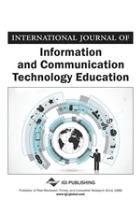
International Journal of Information and Communication Technology Education
Elevating educational practices through innovative technology.International Journal of Information and Communication Technology Education (ISSN: 1550-1876, E-ISSN: 1550-1337), published by IGI Global, stands at the forefront of educational research, focusing on innovative uses of information and communication technologies in the educational landscape. With an impressive impact factor and consistently high rankings—the journal is positioned in the Q3 category for both Computer Science Applications and Education in the 2023 evaluations—this journal serves as a vital platform for scholarly contributions that aim to advance teaching methodologies and enhance learning experiences. Spanning from 2005 to 2024, it explores diverse topics in e-learning and technology-enhanced education, making it an essential resource for researchers, professionals, and students passionate about the intersection of technology and pedagogy. Though specifically not an open-access journal, the invaluable insights it offers foster knowledge dissemination and innovation in the field. Located in the United States, at 701 E Chocolate Ave, Hershey, PA, the journal remains committed to fostering a collaborative and transformative approach to learning in today's digitally-driven society.

Journal of Computing in Higher Education
Shaping Tomorrow’s Education with Today’s Technology.Journal of Computing in Higher Education, published by SPRINGER, stands as a pivotal peer-reviewed journal dedicated to advancing research and practices at the intersection of computing and higher education. With an impressive impact factor and classified in Q1 of the Education category for 2023, it ranks #18 out of 1543 in Scopus's Social Sciences _ Education category and #12 out of 232 in Computer Science, reflecting its substantial influence and high-quality contributions to the field. Established in 1989 and continuing to publish valuable insights through 2024, this journal serves as an essential resource for researchers, educators, and professionals keen on exploring innovative computing methodologies in higher education settings. Although not an open access journal, it provides critical findings and discussions that aim to enhance teaching, learning, and institutional practices in an increasingly digital landscape. Engaging with this journal equips readers with cutting-edge research, aiding their endeavors to shape the future of education through technology.

Journal of Information Technology Education-Research
Catalyzing Research for Tomorrow's Educational TechnologiesThe Journal of Information Technology Education-Research, published by the Informing Science Institute, stands as a pivotal resource in the field of educational technology and computer science. With an ISSN of 1547-9714 and an impressive E-ISSN of 1539-3585, this journal aims to disseminate high-quality research and innovative practices that enhance the integration of information technology in educational contexts. It has achieved commendable rankings, notably Q2 in Computer Science (miscellaneous), Q1 in Education, and Q2 in E-learning for the year 2023, reflecting its significance and impact in these domains. Within the Scopus metrics, it ranks #178 out of 1543 in Social Sciences Education and #50 out of 232 in General Computer Science, positioning it in the top percentiles of its fields. This journal is dedicated to fostering scholarly discourse and providing a platform for educators, researchers, and professionals to share their findings and insights, contributing to the advancement of knowledge and practices in information technology education. The journal covers research from 2011 to 2024, ensuring a comprehensive collection of contemporary studies that engage with current trends and challenges in IT education. For scholars seeking an open-access platform to disseminate their work, this journal presents an invaluable option to engage with a broad academic audience.
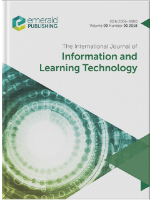
International Journal of Information and Learning Technology
Exploring the Intersection of IT and LearningInternational Journal of Information and Learning Technology is a pivotal publication in the fields of computer science and education, published by the esteemed Emerald Group Publishing Ltd. With an ISSN of 2056-4880, this journal has positioned itself as a valuable resource, reflecting a commitment to high-quality research and discourse in information technology and learning methodologies. Recognized for its significant contributions, it holds a respectable Q2 ranking in both Computer Networks and Communications and Computer Science Applications, along with a prestigious Q1 ranking in Education for the year 2023. The journal spans an expansive converged period from 2015 to 2024, providing an extensive archive of innovative ideas and findings that are instrumental to researchers, educators, and IT professionals alike. Although currently not open access, the publication remains vital to the academic community, ensuring that cutting-edge research and discussions continue to inform and inspire advancements in the integration of technology within learning environments. From its base in Leeds, United Kingdom, the journal invites submissions that explore the nexus of technology and education, fostering a deeper understanding of how digital innovations can enhance teaching and learning experiences.
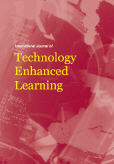
International Journal of Technology Enhanced Learning
Catalyzing Educational Excellence through Technology IntegrationInternational Journal of Technology Enhanced Learning, published by INDERSCIENCE ENTERPRISES LTD, is a premier scholarly journal that comprehensively explores the intersection of technology and education, fostering innovative approaches to enhance learning processes. Established in 2008 and continuing through 2024, the journal is pivotal for researchers, educators, and technology professionals aiming to disseminate and engage with cutting-edge developments in technology-enhanced learning environments. With an admirable ranking in Scopus—placing in the 72nd percentile of Education and 49th in Computer Science Applications—the journal reflects a robust influence in the fields of Computer Science Applications and Education, as evidenced by its Q2 and Q3 quartile rankings. The journal not only provides a platform for empirical research and theoretical discourse but also emphasizes practical implementations in e-learning. Although it does not offer open access, its curated collection of articles serves as a vital resource for scholars and practitioners who are dedicated to advancing the nexus of technology and education.

Studies in Continuing Education
Shaping the Future of Continuing EducationStudies in Continuing Education is a prominent academic journal published by Routledge Journals, Taylor & Francis Ltd, specializing in the vital field of education. Since its inception in 1978, this journal has served as a platform for innovative research and discourse in continuing education, promoting a deeper understanding of lifelong learning processes. With an impressive Q2 quartile ranking in the education category and a commendable Scopus rank of #299 out of 1543, the journal is recognized for its significant contributions to the field, effectively addressing contemporary issues and trends in adult and continuing education. While not an open access journal, it offers well-rounded insights into policy, practice, and research methodologies that are indispensable for researchers, educators, and higher education professionals. For nearly five decades, Studies in Continuing Education has played a crucial role in shaping the academic landscape of education, making it a must-read for those seeking to advance their expertise in this vital area.
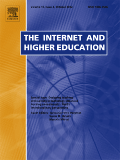
Internet and Higher Education
Connecting Ideas, Shaping Futures in Digital LearningWelcome to Internet and Higher Education, a premier journal published by Elsevier Science Inc, focusing on the dynamic intersection of technology and education. Established in 1998, this journal provides a platform for innovative research and critical discussions in the fields of Computer Networks and Communications, Computer Science Applications, and E-learning, consistently ranked in the Q1 quartile across multiple categories in 2023. With an impressive Scopus ranking placing it in the top 1% of Social Sciences and Computer Science categories, Internet and Higher Education aims to foster interdisciplinary collaboration and advance our understanding of digital learning environments. The journal invites contributions that explore the impact of the internet on higher education, offering tangible insights for educators, administrators, and policymakers alike. Stay updated on the latest findings and trends that are shaping the future of education through technology.
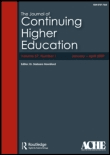
Journal of Continuing Higher Education
Navigating the Evolving Landscape of Adult LearningThe Journal of Continuing Higher Education is a premier publication dedicated to advancing the dialogue around adult learning, professional development, and transformative educational practices in higher education. Published by Routledge Journals, Taylor & Francis Ltd, this journal is recognized for its rigorous research articles and insightful reviews, guiding educators and practitioners in enhancing lifelong learning. With a notable impact factor and a Q2 ranking in Education as of 2023, it plays a pivotal role in shaping policies and practices in the field. The journal embraces a broad scope, encompassing various aspects of continuing higher education from theory to application, and is committed to fostering innovative approaches that respond to the evolving needs of adult learners. Accessible to professionals, researchers, and students alike, the Journal of Continuing Higher Education serves as an invaluable resource for those dedicated to improving educational outcomes for non-traditional students, ensuring that the knowledge shared therein remains relevant and impactful.